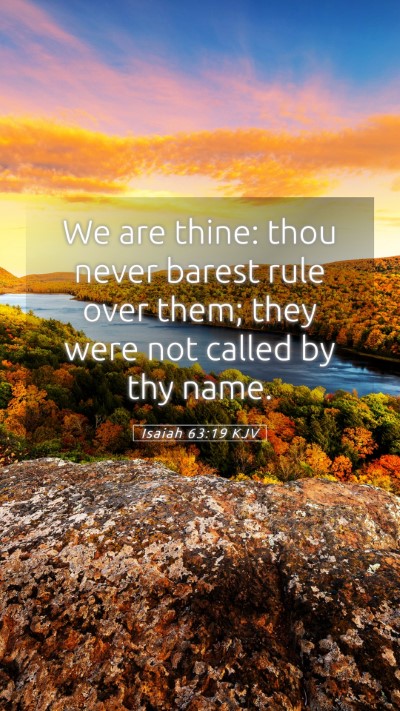Understanding Isaiah 63:19
This Bible verse, found in the book of Isaiah, deals with themes of estrangement from God, compassion, and the plea for divine intervention. The insights provided by well-respected public domain commentaries, including those by Matthew Henry, Albert Barnes, and Adam Clarke, help illuminate its meaning, significance, and application in the lives of believers.
Verse Context
Isaiah 63:19 states:
"We are thine: thou never barest rule over them; they were not called by thy name."
This passage is a heartfelt plea emphasizing the relationship between God and His people, presenting both a recognition of divine sovereignty and a lament over their estrangement.
Verse Explanation
Verse Analysis
According to Matthew Henry, this verse serves as a reflective summary of Israel's condition and their longing for God. The lament highlights Israel’s position as the people of God, emphasizing that despite their disobedience, they still belong to Him:
- Identity in God: The phrase "We are thine" signifies a declaration of belonging and reliance on God.
- Divine Rule: "Thou never barest rule over them" implies a recognition of Israel's failure to live under God's authority, indicating a fractured relationship.
- Calling and Purpose: The lament that "they were not called by thy name" suggests a loss of identity and the consequences of disassociation from God.
Spiritual Interpretation
Albert Barnes describes this passage as a poignant inquiry into God’s perceived abandonment of His people. It exposes a deeper emotional struggle within the community. Here are key aspects of his analysis:
- Divine Sovereignty: Barnes points out that despite Israel's waywardness, God's sovereignty remains unquestionable.
- Repentance and Hope: This verse also serves as a call for repentance, acknowledging God's identity and seeking restoration.
Theological Implications
Adam Clarke discusses the implications of this verse in terms of covenantal theology. He indicates the significance of God's chosen people and how their identity is intricately linked to their obedience and recognition of God’s authority. Additionally:
- Historical Context: Clarke emphasizes the historical context of Israel's disobedience and exile as a backdrop against which this lament must be understood.
- Covenant Relationship: The assertion that they are God’s people underlines the covenant relationship established between God and Israel.
Application for Believers
Isaiah 63:19 reflects a profound truth that is still applicable today. Believers can derive practical applications from this verse:
- Reflection on Identity: Understanding one's identity in Christ fosters a deeper relationship with God.
- Recognition of Authority: Embracing God’s rightful place in one’s life enables spiritual growth and restores the relationship.
- Plea for Intimacy: The cry of Israel encourages believers to earnestly seek intimacy with God, recognizing their dependency on Him.
Related Scripture References
This verse can be cross-referenced with the following Scriptures that share similar themes of longing for God and covenant relationships:
- Isaiah 64:7: "And there is none that calleth upon thy name, that stirreth up himself to take hold of thee."
- Psalms 44:23-26: A plea for God to awaken and reconsider His people.
- Jeremiah 14:8: An appeal for deliverance and recognition of God’s relationship with His people.
Conclusion
Isaiah 63:19 serves as a profound reminder of the believer’s identity as part of God’s people and the eternal significance of recognizing His rule in our lives. As seen through the lens of public domain commentaries, this verse offers rich Bible verse meanings and interpretations that can cultivate deeper Bible study insights. Understanding this passage can lead to more profound biblical exegesis, enhancing our ability to study and apply God’s Word in our daily lives.


